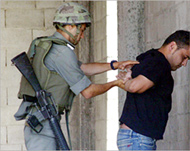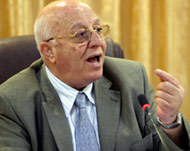Fatah: No serious internal divisions
Palestinian National Security Adviser Jibril al-Rajub has denied that the postponement of Fatah’s general conference is indicative of a serious internal division within the organisation.

Speaking to Aljazeera on Monday, al-Rajub acknowledged the existence of differences among Fatah members on the issue, but argued that these had not developed into a serious internal division within the secular, nationalist organisation.
He said Fatah’s decision to end its monopoly on political authority was a strategic move that would not be reversed, adding that legislative elections would be held in due course of time.
Al-Rajub said the postponement of the election was due to legal reasons. “Political pluralism and government change via the ballot box is a Fatah article of faith. It is a guarantor of national unity and our national vision, and one that will lead us safely to the establishment of the Palestinian state,” he said.
Hamas threat
Meanwhile, after a four-month lull in fighting, Palestinian resistance groups have stepped up a threat to withdraw from a ceasefire with Israel but have stopped short of pulling out of the deal.
 |
|
Al-Rajub: Fatah’s decision to end |
The factions, including Hamas and Islamic Jihad, accused Israel on Monday of violating the truce with continued military operations.
“A one-sided truce will not be accepted and cannot continue,” said a statement issued by 13 Palestinian factions. “We hold the Zionist enemy completely responsible for the deterioration of the truce.”
Leaders of Hamas and Islamic Jihad, which have carried out dozens of anti-Israel bombings in recent years, issued a similar warning on Sunday.
In their statement on Monday, the groups said they would continue to consult with one another to determine an “appropriate response to the ongoing aggression”.
Israeli Prime Minister Ariel Sharon and Palestinian leader Mahmoud Abbas declared the ceasefire at a summit in Egypt in February, hoping to end more than four years of fighting.
Drop in violence
The following month, the Islamic groups agreed to honour the deal. A collapse in the truce would be a major setback for Abbas’ efforts to restart peace talks.
The ceasefire has brought a sharp drop in violence, although sporadic fighting has persisted.
“A one-sided truce will not be accepted and cannot continue. We hold the Zionist enemy completely responsible for the deterioration of the truce” Statement by 13 Palestinian factions |
Abbas met with resistance groups in Gaza last week in an effort to shore up the truce following a new flare-up that included an Israeli raid that killed two Islamic Jihad fighters and a Palestinian mortar barrage that killed three people.
In new violence Monday, Palestinians fired a rocket into a Jewish settlement in the northern Gaza Strip, the army said.
Palestinian fighters also fired mortar shells and fired at Israeli soldiers in northern Gaza over the weekend, it said. No injuries were reported.
With tensions rising, Egyptian intelligence chief Omar Suleiman is expected in the region this week for talks with Israeli and Palestinian officials in a bid to bolster the ceasefire and to discuss Israel’s imminent withdrawal from the Gaza Strip.
Gaza withdrawal
Egypt is often a mediator between the two sides.
The visit is part of a flurry of diplomacy leading up to a 21 June meeting between Sharon and Abbas, their first gathering since the February summit.
 |
|
The Palestinian Authority has |
Egypt’s foreign minister, Ahmed Aboul Gheit, and US Secretary of State Condoleezza Rice are also scheduled to visit in the coming week.
In last week’s talks in Gaza, Abbas agreed to give the resistance groups a role in preparations for Israel’s Gaza withdrawal, scheduled for August.
The Palestinian Authority also released two Islamic Jihad prisoners it had been holding for involvement in a 25 February bombing in Tel Aviv after they were acquitted by a Palestinian court.
The Israeli army has greatly reduced its activities in the occupied territories but continues to arrest or attack Palestinians it believes are actively involved in violence against Israelis.
Lawlessness wave
Israel has said it is willing to work with Abbas to plan for its Gaza withdrawal. But it says it won’t resume peace talks until Abbas reins in anti-Israeli fighters. But Abbas refuses to confront the groups, preferring to negotiate with them.
A resumption of violence would also hinder Abbas’ efforts to crack down on a growing wave of lawlessness in the Palestinian areas.
Interior Minister Nassr Yousef told Aljazeera on Monday that steps are being taken deploy more security personnel and improve public safety in the Palestinian territories.
 |
|
Israel says it will continue to |
Those responsible for causing disorder and lawlessness are being arrested, he said, adding that the occupation is a trigger for the security disturbances.
Yousef said currently Palestinians are suffering as a result of Israeli occupation and Palestinian lawlessness, compounded by the easy availability of weapons.
“The Interior Ministry is doing its best to assert its authority, enforce law and order, and formulate a serious mechanism to regulate the quantity of arms present on the Palestinian Street.”
Earlier on Sunday, the Palestinian Authority carried out its first executions since 2002, killing four convicted murderers in a campaign meant to stop the chaos.
The late Palestinian leader, Yasser Arafat, had halted the practice three years ago amid international criticism.
Internal rivalries
Abbas has made public order a top priority, but his forces have been weakened by internal rivalries, a lack of resources and years of fighting with Israel.
Despite Abbas’ efforts to revamp his security forces, armed gangs continue to operate with virtual impunity in Palestinian areas.
 |
|
Qurei: The current state of chaos |
Sunday’s executions appeared to be an attempt to deter criminals and send a message to the public without directly confronting the resistance groups.
None of the executed men is believed to be affiliated with any of the major groups. Their crimes dated to the mid-1990s.
Meanwhile, Palestinian Prime Minister Ahmad Qurei has called on Palestinian security forces to put an end to the chaos and security breakdown in Palestinian territories.
The current state of affairs is unacceptable and the issue should be given top priority by the Palestinian Authority in order to ease living conditions, Qurei said.
Later on Monday, a statement by Islamic Jihad said the Palestinian Authority detained two of its members at the Jericho prison in the West Bank.
The statement added that the group expected the men to be freed.